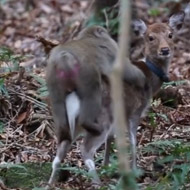
Incident observed on Yakushima Island
A male Japanese monkey has been observed trying to mate with female sika deer.
The incident was filmed by researchers on Yakushima Island, Japan, and is described in the journal Primates.
The researchers say that while Japanese macaques are known to ride deer in a playful manner, this particular monkey displayed obvious sexual behaviour towards several female deer.
‘Although this phenomenon may be explained as copulation learning, this is highly unlikely,’ the authors write.
‘The most realistic hypothesis would be that of mate deprivation, which states that males with limited access to females are more likely to display this behaviour.
‘Whatever the cause for this event may be, the observation of highly unusual animal behaviour may be a key to understanding the evolution of heterospecific mating behaviour in the animal kingdom.’
This is not the first example of mating behaviour between different species. In 2014, Antarctic fur seals were caught trying to mate with king penguins.
The study, which made headlines around the world, found that some penguins were eaten and killed after the mating occurred.
Image (C) Alexandre Bonnefoy



 The RCVS has announced a new version of its 1CPD mobile app, with enhanced features for veterinary surgeons and veterinary nurses to record their continuing professional development.
The RCVS has announced a new version of its 1CPD mobile app, with enhanced features for veterinary surgeons and veterinary nurses to record their continuing professional development.